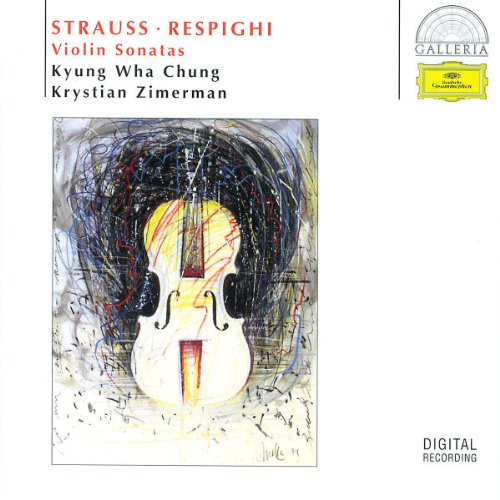R. Strauss/Respighi Violin Sonatas
View record and artist detailsRecord and Artist Details
Composer or Director: Ottorino Respighi, Richard Strauss
Label: DG
Magazine Review Date: 2/1990
Media Format: CD or Download
Media Runtime: 52
Mastering:
DDD
Catalogue Number: 427 617-2GH

Tracks:
| Composition | Artist Credit |
|---|---|
| Sonata for Violin and Piano |
Richard Strauss, Composer
Krystian Zimerman, Piano Kyung Wha Chung, Violin Richard Strauss, Composer |
Author: Michael Oliver
I have greatly enjoyed Lydia Mordkovitch's account (on Chandos) and Dmitry Sitkovetsky's (on Virgin Classics) of the Strauss Sonata, and would still recommend either if you prefer their couplings to Chung's (Mordkovitch offers Faure's Sonata, Sitkovetsky those by Janacek and Debussy, though the latter is a disappointingly unidiomatic reading). But Chung brings so much more to the Strauss, and she has such an outstandingly poetic pianist, that hers is the performance I would most readily live with. Her palette of violin sound is broader, to begin with: she has ample richness of colour, but leaves plenty of room for quiet pensiveness and hushed delicacy. Compare the opening of the first movement's coda in her intimately sotto voce reading with Mordkovitch's fuller, rather too forceful handling of it, or Sitkovetsky's ardent but edgy manner (partly due to Virgin's bright, slightly acid recording) and you will see what I mean. It's striking, too, how much more relaxed Chung sounds in this movement, though taking it noticeably faster than either of the others. Her intimacy of manner is especially telling in the slow movement, where it gives maximum contrast with the ardour of the middle section and allows the passage with filigree accompaniment from the piano to flower most beautifully.
Both of the other violinists have more sonorously demonstrative partners, and Virgin's recording makes rather too much of the contrast between Sitkovetsky's brilliance of sound and his pianist's flamboyant richness. At the recapitulation in the finale, the whole Sonata's satisfying climax, the balance between violin and piano is most successfully managed by Chung and Zimerman: his mercurial vividness is a fine foil to her opulence at this point, whereas both Mordkovitch and Sitkovetsky are slightly unequal partners.
What about the Respighi? Well, as an admirer of his who would not hitherto have dreamt of including the Violin Sonata among the most convincing arguments for taking him seriously, I can say that it has never convinced me more than in this performance. The firm structure underlying the improvisatory, rhapsodic manner of the first movement, with its riskily frequent changes of tempo, has never seemed more cogent, nor the Andante's progression from rather melancholy lyricism via a plangent urgency to a tranquil resumption of the original idea more satisfying. I still find the abruptly jerky final passacaglia, despite the welcome contrast of its subsidiary theme, a bit of a disappointment, but Chung earnestly insists that I should persevere. The recording is excellent, the balance between violin and piano (not perfect in either of the comparisons listed above) being especially well judged.'
Both of the other violinists have more sonorously demonstrative partners, and Virgin's recording makes rather too much of the contrast between Sitkovetsky's brilliance of sound and his pianist's flamboyant richness. At the recapitulation in the finale, the whole Sonata's satisfying climax, the balance between violin and piano is most successfully managed by Chung and Zimerman: his mercurial vividness is a fine foil to her opulence at this point, whereas both Mordkovitch and Sitkovetsky are slightly unequal partners.
What about the Respighi? Well, as an admirer of his who would not hitherto have dreamt of including the Violin Sonata among the most convincing arguments for taking him seriously, I can say that it has never convinced me more than in this performance. The firm structure underlying the improvisatory, rhapsodic manner of the first movement, with its riskily frequent changes of tempo, has never seemed more cogent, nor the Andante's progression from rather melancholy lyricism via a plangent urgency to a tranquil resumption of the original idea more satisfying. I still find the abruptly jerky final passacaglia, despite the welcome contrast of its subsidiary theme, a bit of a disappointment, but Chung earnestly insists that I should persevere. The recording is excellent, the balance between violin and piano (not perfect in either of the comparisons listed above) being especially well judged.'
Discover the world's largest classical music catalogue with Presto Music.

Gramophone Digital Club
- Digital Edition
- Digital Archive
- Reviews Database
- Full website access
From £8.75 / month
Subscribe
Gramophone Full Club
- Print Edition
- Digital Edition
- Digital Archive
- Reviews Database
- Full website access
From £11.00 / month
Subscribe
If you are a library, university or other organisation that would be interested in an institutional subscription to Gramophone please click here for further information.





